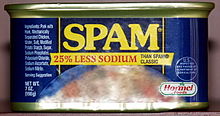Breakfast meat
Breakfast meat is crushed, cured , pressed and seasoned pork (lean meat, bacon and rind ) that is cooked in its own juice and is usually offered in tins . The cooking juice gels it into a solid block. In terms of production, it is similar to corned beef .
Breakfast meat is eaten cold as a topping on bread or fried briefly in thick slices, for example with fried or scrambled eggs .
history
The first supplier of luncheon meat was the Hormel Foods Corporation from Minnesota in 1937 , which had already brought the first canned meat to the market in 1926. First as Hormel Spiced Ham ( "spiced ham Hormels") offered, the name was for a customer competition in Spam changed ( portmanteau of Spiced Ham ). Spam became an international success, also thanks to its spread by the American military in the course of World War II - for example, Soviet soldiers were supplied with spam in 1945 .
From 1955 onwards, production also began outside the USA , initially in Ireland , Canada , Great Britain and Venezuela , and since 1969 also in Australia . Today spam is widespread in 41 countries (but not in Germany). After the US, the UK and South Korea are the largest consumers.
In the English-speaking world, the name Spam became the generic name for luncheon meat , and later, thanks to a sketch by the Monty Python group, it became a synonym for unsolicited advertising emails worldwide (see Spam ).
There are numerous similar products that are offered as breakfast meat in German-speaking countries, some of them made from other types of meat such as poultry (especially for the market in Islamic countries). The largest supplier in Germany is the Danish manufacturer Tulip Food Productions , which also produces spam for the British market .
Web links
- Website of spam (English)

